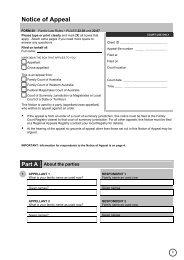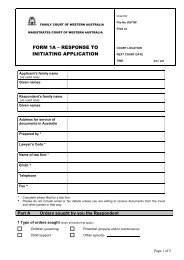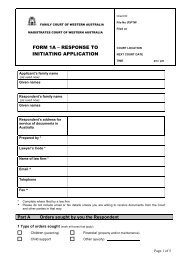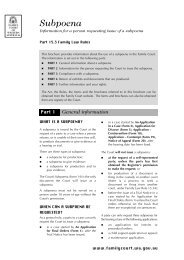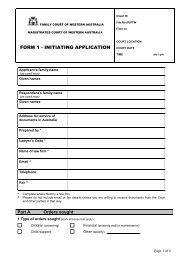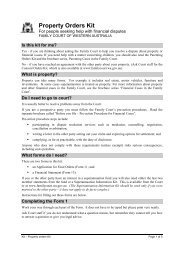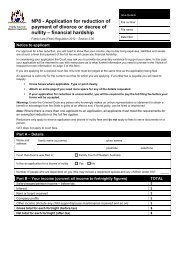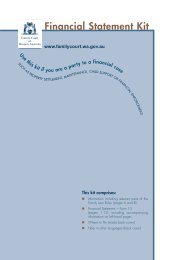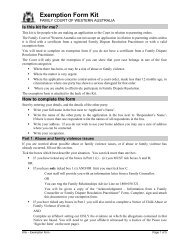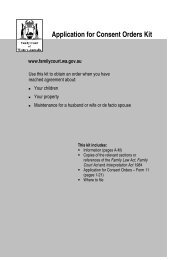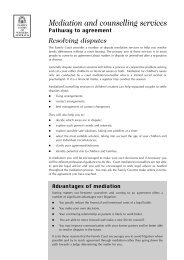Y and M [2007] - Family Court of Western Australia
Y and M [2007] - Family Court of Western Australia
Y and M [2007] - Family Court of Western Australia
You also want an ePaper? Increase the reach of your titles
YUMPU automatically turns print PDFs into web optimized ePapers that Google loves.
JURISDICTION:FAMILY COURT OF WESTERN AUSTRALIAACT: FAMILY LAW ACT 1975LOCATION:PERTHCITATION: Y <strong>and</strong> M [<strong>2007</strong>] FCWA 89CORAM:PENNY JHEARD: 4 JULY <strong>2007</strong>DELIVERED: 18 JULY <strong>2007</strong>FILE NO/S: PT 941 <strong>of</strong> 2005BETWEEN:YAppellant/FatherANDMRespondent/Mother
Catchwords:Father's appeal against order to allow mother to remove child from <strong>Western</strong><strong>Australia</strong> for a trip [overseas] - appeal dismissedLegislation:<strong>Family</strong> Law Act 1975Jurisdiction <strong>of</strong> <strong>Court</strong>s (<strong>Family</strong> Law) Act 2006 - s 27(2)Category:Not ReportableRepresentation:Counsel:Appellant:Respondent:Ms D DimondMs S Strapps
Solicitors:Appellant:Respondent:Dimond <strong>Family</strong> LawyersWomen's Law CentreCase(s) referred to in judgment(s):Good <strong>and</strong> Good (1982) FLC 91-249Kuebler <strong>and</strong> Kuebler (1978) FLC 90-434Line <strong>and</strong> Line (1997) FLC 92-729V <strong>and</strong> V (2004) FLC 93-201
1 The application before the <strong>Court</strong> is the father’s appeal filed on 12June <strong>2007</strong> from the orders made by Magistrate Moroni permitting themother to remove the parties’ child from <strong>Western</strong> <strong>Australia</strong> for a 12week trip [overseas].Background2 Both parties were born [overseas]. The father is 45 years <strong>of</strong> age<strong>and</strong> the mother is 37 years <strong>of</strong> age. The parties met [overseas] <strong>and</strong>were married in [the capital city] in June 2003. Shortly after theirmarriage the parties moved to <strong>Australia</strong>. Approximately one monthlater, the parties’ only child, [M], was born in March 2004.3 The parties separated in September 2004 <strong>and</strong> since separation therelationship between them has been poor. Certain allegations havebeen made by the parties during these proceedings, however; they arenot necessarily relevant for this particular interim application.4 The father initiated proceedings in the <strong>Court</strong> in February 2005,seeking parenting orders in relation to [M]. Although thoseproceedings are still on foot, little has occurred in the way <strong>of</strong> theirfinalisation.5 The parties agreed to interim orders on 20 April 2005 that [M]would reside with the mother <strong>and</strong> she would be responsible for herday-to-day care, welfare <strong>and</strong> development. The father was to havesupervised contact with [M] on four occasions <strong>of</strong> 2 hours durationprior to 2 May 2005 <strong>and</strong> thereafter for periods <strong>of</strong> 2 hours on providingthe mother’s solicitors at least 7 days’ notice. The orders alsorequired [M]’s passport to be delivered up <strong>and</strong> held by the <strong>Court</strong>, <strong>and</strong>an injunction was granted restraining each party from removing [M]from <strong>Western</strong> <strong>Australia</strong>.6 Since the orders were made the father has relocated to [theEastern states] <strong>and</strong> continues to reside there. According to the mother,the father has not had a great deal <strong>of</strong> contact with [M]. She says thathe has only seen [M] on three occasions in the last six months, being 2December 2006, 28 April 2006 <strong>and</strong> 29 April 2006. There has been nocontact by telephone or letters between the father <strong>and</strong> [M].
7 The mother filed an application for temporary orders on 21 May <strong>2007</strong>to suspend for a 12 week period the contact arrangements currently inplace pursuant to the orders made on 20 April 2005. During that 12week period the mother seeks to remove [M] from <strong>Western</strong> <strong>Australia</strong>for the purposes <strong>of</strong> travelling [overseas].8 The mother’s application was heard on 11 June <strong>2007</strong>. The fatherfiled a responding application at the commencement <strong>of</strong> the hearingobjecting to the mother accessing [M]’s passport <strong>and</strong> travelling[overseas]. At the conclusion <strong>of</strong> the hearing orders were made byMagistrate Moroni granting the mother permission to take [M] to[overseas] for a period <strong>of</strong> not more than 12 weeks.9 On 12 June <strong>2007</strong> the father filed a Notice <strong>of</strong> Appeal <strong>and</strong> anapplication for an urgent stay <strong>of</strong> the orders made by MagistrateMoroni, <strong>and</strong> sought an injunction restraining the mother fromremoving [M] from the Commonwealth <strong>of</strong> <strong>Australia</strong>.10 The Notice <strong>of</strong> Appeal was listed before me for a directionshearing on 25 June <strong>2007</strong>, while the application to stay the orders waslisted before Magistrate Moroni on 18 June <strong>2007</strong>.11 At the hearing on 18 June <strong>2007</strong> Magistrate Moroni granted a stay<strong>of</strong> the orders made on 11 June <strong>2007</strong> until the directions hearing beforeme on 25 June <strong>2007</strong>. The matter came before me on that date <strong>and</strong> theapplication was adjourned to a special appointment before me on 4July <strong>2007</strong>, at which time the appeal was adjourned for judgment.Appeal12 There was an issue as to whether the father needed leave toappeal the decision <strong>of</strong> the Magistrate. The <strong>Family</strong> Law Act 1975 hasrecently been amended by the Jurisdiction <strong>of</strong> <strong>Court</strong>s (<strong>Family</strong> Law) Act2006 which amends, amongst other things, the way in which an appealfrom a <strong>Western</strong> <strong>Australia</strong>n Magistrate is dealt with.13 Prior to the amendments an appeal from a decision <strong>of</strong> aMagistrate did not require leave <strong>and</strong> was conducted pursuant to s 96as a hearing de novo before a single judge <strong>of</strong> the <strong>Family</strong> <strong>Court</strong> <strong>of</strong><strong>Western</strong> <strong>Australia</strong>. Appeals from Magistrates are now dealt withunder s 94AAA which provides that the jurisdiction in relation to anappeal <strong>of</strong> a decision <strong>of</strong> a Magistrate <strong>of</strong> <strong>Western</strong> <strong>Australia</strong> is to beexercised by a Full <strong>Court</strong> unless the Chief Judge considers itappropriate for the jurisdiction to be exercised by a single Judge.
14 Whether or not the father requires leave depends on theinterpretation <strong>of</strong> the commencement <strong>of</strong> the new provisions. Section27(2) <strong>of</strong> the Jurisdiction <strong>of</strong> <strong>Court</strong>s (<strong>Family</strong> Law) Act deals with thecommencement date <strong>of</strong> the relevant amended appeal section. Itprovides:“The amendments made by items 1, 2, 4, 6, 7, 9, 19, 20 to 24 <strong>and</strong>26 apply to proceedings instituted after the commencement <strong>of</strong>this Part in the Magistrates <strong>Court</strong> <strong>of</strong> <strong>Western</strong> <strong>Australia</strong>constituted by a <strong>Family</strong> Law Magistrate <strong>of</strong> <strong>Western</strong> <strong>Australia</strong>”15 The procedure to be followed in relation to the father’s appealdepends on the interpretation <strong>of</strong> the terms “proceedings instituted”.The father’s originating application was filed in 2005, prior to theintroduction <strong>of</strong> the amendments, however; the application before the<strong>Court</strong> which is subject <strong>of</strong> the father’s appeal was filed in <strong>2007</strong>, afterthe introduction <strong>of</strong> the amendments.16 When the appeal was lodged the Appeals Registrar consideredthe appeal to be heard pursuant to s 96 <strong>and</strong> conducted as a hearing denovo before a single judge. Consequently, the matter was listed for adirections hearing on 25 June <strong>2007</strong> before me.17 The term “proceedings” is defined in s 4(1) <strong>of</strong> the Act as “aproceeding in a court, whether between parties or not, <strong>and</strong> includescross-proceedings or an incidental proceeding in the course <strong>of</strong> or inconnexion with a proceeding.” However the terms “instituted” or“institution” are not defined in the Act. I think that this term is thekey word in interpreting upon which law the appeal lies.18 The father, in his written submissions, refers to the Full <strong>Court</strong>decision in Good <strong>and</strong> Good (1982) FLC 91-249 which deals with theinstitution <strong>of</strong> proceedings in relation to s 44(3) <strong>of</strong> the Act. The Full<strong>Court</strong> said:“…once the husb<strong>and</strong> had made his application under sec. 78there were between the parties properly instituted proceedingsfalling within para. (ca). It was then open to either party at anytime while these proceedings were pending to file furtherapplications or cross-applications or to amend pleadings to seekorders with respect to the property <strong>of</strong> the parties under sec. 78 or79 without seeking leave under sec. 44(3). Such furtherapplications or amendments should not, in our view, be regarded
as the institutions <strong>of</strong> proceedings under para. (ca) for thepurposes <strong>of</strong> sec. 44(3)” [emphasis added]19 Further, s 25 <strong>of</strong> the Jurisdiction <strong>of</strong> <strong>Court</strong>s (<strong>Family</strong> Law) Act,which amends s 94A <strong>of</strong> the Act, differs in its use <strong>of</strong> the word“proceedings”. It provides:“(5) If, in proceedings in the Magistrates <strong>Court</strong> <strong>of</strong> <strong>Western</strong><strong>Australia</strong> constituted by a <strong>Family</strong> Law Magistrate <strong>of</strong> <strong>Western</strong><strong>Australia</strong>, being proceedings in which a decree or decision towhich subsection 94AAA(1A) applies could be made, a question<strong>of</strong> law arises which:..”20 It could be suggested from the differing use <strong>of</strong> the termproceedings, the terms “proceedings instituted” Parliament wasintending to refer to the substantive proceedings.21 Based on the wording <strong>of</strong> s 27(2) <strong>of</strong> the amending Act, <strong>and</strong> thedate the original application was filed, I am <strong>of</strong> the opinion that theinstitution <strong>of</strong> these proceedings occurred when the father filed hisapplication in February 2005. Therefore, the matter should be heardas a de novo before a single judge <strong>of</strong> the <strong>Family</strong> <strong>Court</strong> <strong>of</strong> <strong>Western</strong><strong>Australia</strong>.Mother’s position22 The mother wants to go [overseas] to visit her mother, who is illwith heart disease. She is particularly concerned that her mother’shealth is precarious, <strong>and</strong> she is anxious to see her mother as soon aspossible, as well as giving [M] the opportunity to meet hergr<strong>and</strong>mother <strong>and</strong> other members <strong>of</strong> her extended family. Sheconcedes that it would be cheaper if her mother came to <strong>Australia</strong>, butshe says that she is not well enough to travel.23 The mother does not consider herself a risk to stay [overseas].She says she has made efforts to stay in <strong>Australia</strong>. She became an<strong>Australia</strong>n citizen in February <strong>2007</strong> <strong>and</strong> has built a life here for her<strong>and</strong> her daughter. She says she has made many friends through her[community] Church <strong>and</strong> has the benefit <strong>of</strong> her sister <strong>and</strong> her threechildren living in Perth. Further, she has commenced [formal studiesin English] <strong>and</strong> has enrolled [M] in kindergarten for 2008.24 Although the mother acknowledges that the <strong>Australia</strong>nGovernment has issued warnings for <strong>Australia</strong>ns travelling [overseas],she says they are mainly centred around [a particular] region, which
is an area she does not intend to travel near. She says she does notintend to travel to tourist areas. The mother says that she is familiarwith the area <strong>and</strong>, therefore, knows what areas to avoid.25 The mother also recognises that the medical treatment available[overseas] is not at the same level as in <strong>Australia</strong>. Consequently, sheplans to take out comprehensive travel insurance. She also says that ifshe is permitted to go, she intends to contact her doctor in relation toany immunizations that are required.26 The mother says that she is unable to provide any security as sheis in a financially difficult situation. She is currently living in rentalaccommodation provided through her Church <strong>and</strong> is on the waitinglist for Homeswest housing. She is currently studying <strong>and</strong> receivesCentrelink benefits <strong>and</strong> $100 per week from the father for childsupport. The trip [overseas] has been funded by friends from herChurch <strong>and</strong>, as such, she does not have any extra funds to providesecurity.27 If [M] is not permitted to go [overseas], then the mother will notgo. Further, she says that if she did not consider the trip to be safe,she would not be going.Father’s position28 The father objects to the wife taking [M] [overseas]. He isparticularly concerned about the travel warnings which have beenissued by the Department <strong>of</strong> Foreign Affairs <strong>and</strong> Trade (“DFAT”).29 The father believes that the mother has minimised his role in[M]’s life <strong>and</strong> has made it difficult for him to see her. The father saysthat he comes to Perth approximately once a month to visit [M]. Hesays during 2006 he saw [M] on approximately 16 occasions.30 The father raises the following concerns over [M] travelling[overseas]:(a)if the mother is permitted to travel [overseas] with [M] shewill not return to <strong>Australia</strong>. He is critical <strong>of</strong> the mother <strong>and</strong>says that she has been dishonest since they married;(b) a travel warning has been issued by DFAT;(c) risk <strong>of</strong> terrorists attacks;(d) civil unrest <strong>and</strong> political tension;
(e) a high risk <strong>of</strong> road accidents due to poor driving conditions;(f)poor level <strong>of</strong> medical treatment <strong>and</strong> there would be nomedical insurance for [M] if she travels [overseas]; <strong>and</strong>(g) [the overseas country] is not a signatory to the HagueConvention.31 The father is concerned that as [M] is only young, spending 12weeks away from him may cause difficulties when contact resumes.He says that he has no objection to the mother travelling [overseas] onher own, <strong>and</strong> he is capable <strong>of</strong> caring for [M] during that time.The Law32 The Act states that when making a parenting order the paramountconsideration to be taken into account by the <strong>Court</strong> is the best interests<strong>of</strong> the child.33 Both parties put forward relevant considerations to be taken intoaccount in determining whether it is in the best interest <strong>of</strong> [M] to go[overseas].34 The father focused predominantly on the issues <strong>of</strong> safety <strong>and</strong>instability [overseas]. In V <strong>and</strong> V (2004) FLC 93-201 Rowl<strong>and</strong>s Jdismissed the father’s application for an order permitting him to takethe child on a holiday to Dubai. His Honour particularly relied on thetravel warning issued by the <strong>Australia</strong>n Government:“The <strong>Court</strong>, while wholly independent <strong>of</strong> the executive branch <strong>of</strong>government, should generally accept a statement <strong>of</strong> this kind bythe specialist federal government department on overseas affairsunless there is real reason to doubt its accuracy or good faith. The<strong>Court</strong> cannot itself conduct an independent investigation <strong>of</strong> theissue.”35 His Honour went on to say:“Certainly I can accept that a government department for all sorts<strong>of</strong> reasons may err on the side <strong>of</strong> caution in these types <strong>of</strong>publications.I also accept that a parent may have unrealistic fears for thesafety <strong>of</strong> a young child.
Here there is not convincing attack upon the worth <strong>of</strong> theDepartment’s advice.”36 The mother referred the <strong>Court</strong> to the decisions in Kuebler <strong>and</strong>Kuebler (1978) FLC 90-434 <strong>and</strong> Line <strong>and</strong> Line (1997) FLC 92-729.37 The Full <strong>Court</strong> in Kuebler (supra) said:“[T]he considerations that should be given to an applicationwhich involves the custodial parent taking a child out <strong>of</strong> thejurisdiction, without being exhaustive, would be these:(a) The length <strong>of</strong> the proposed stay out <strong>of</strong> the jurisdiction;(b) The bona fides <strong>of</strong> the application;(c) The effect on the child <strong>of</strong> any deprivation <strong>of</strong> access;(d) Any threats to the welfare <strong>of</strong> the child by the circumstances<strong>of</strong> the proposed environment;(e) The degree <strong>of</strong> satisfaction in which the <strong>Court</strong> based itsassessment <strong>of</strong> the parties that a promise <strong>of</strong> a return to thejurisdiction would be honoured.”38 In Line <strong>and</strong> Line (supra) the Full <strong>Court</strong>, in determining theappropriate level <strong>of</strong> security to be paid by the wife, considered thefactors outlined in Kuebler (supra) <strong>and</strong> drew attention to four otherprinciples they believed to be appropriate:(a) two-fold consideration regarding the purpose <strong>of</strong> security:(i) to provide a sum which will realistically entice theperson removing the children to return; <strong>and</strong>(ii) to provide a sum to adequately provision the partyremaining in <strong>Australia</strong>, to take action for the return <strong>of</strong> thechildren;(b) the degree <strong>of</strong> risk that the departing parent will choose notto return;(c) whether the country to which the parent intends to travelwith the children is or is not a signatory to the HagueConvention on Child Abduction;(d) the financial circumstances <strong>of</strong> both parties <strong>and</strong> the relativehardship imposed on the departing parent by fixing securityat a particular level as compared with the hardship which
the non-departing parent would suffer if security were fixedat a lower level.39 In relation to the country being a signatory to the HagueConvention the Full <strong>Court</strong> went on to say:“…the <strong>Court</strong> would have to bear in mind that, even if thedesignated destination is a convention country, once thedeparting parent has left <strong>Australia</strong> there may be little to preventhim or her deviating from that designated destination to anotherdestination in a non-convention country or, after going to thedesignated destination, from then travelling on to a nonconventioncountry.”Analysis <strong>and</strong> Conclusion40 Despite the father’s concerns that the mother’s mother is not asill as she says, I am <strong>of</strong> the opinion that the mother’s application isbona fides. There was no evidence to suggest that the trip is simply aholiday for the mother <strong>and</strong> child. It appears clear that the mother’sintentions are to visit her sick mother <strong>and</strong> give her daughter theopportunity to meet her gr<strong>and</strong>mother <strong>and</strong> other members <strong>of</strong> herextended family.41 The mother intends to stay [overseas] for 12 weeks. Althoughthis is quite a lengthy period <strong>of</strong> time, [M] is not <strong>of</strong> an age where it willaffect her schooling. She is not enrolled to start kindergarten until2008. I appreciate the husb<strong>and</strong> raises concerns about the interruption<strong>and</strong> difficulties it may cause to his contact with [M], however; I notethat the father has moved to Sydney on his own volition. The mothersays that between 2 December 2006 <strong>and</strong> 28 April <strong>2007</strong> the husb<strong>and</strong>had no contact with [M], some four <strong>and</strong> a half months. She says thatthis was not through her actions, as she has never refused contact.Further, there was no contact by telephone or letters. I do not considerthat the intended period <strong>of</strong> travel will be the cause <strong>of</strong> any difficultieswhen contact resumes between [M] <strong>and</strong> her father.42 Clearly, one <strong>of</strong> the most contentious issues in permitting themother to go is the risk associated with travelling [overseas]. The<strong>Australia</strong>n Government has issued travel warnings, particularly inrelation to terrorist attacks. I acknowledge the comments made byRowl<strong>and</strong> J in V <strong>and</strong> V, however; in that case the proposed trip was forthe purposes <strong>of</strong> a holiday to meet up with friends from the UnitedKingdom, <strong>and</strong> Dubai was roughly half-way between United Kingdom
<strong>and</strong> <strong>Australia</strong> <strong>and</strong> it <strong>of</strong>fered tourist resorts. The mother in this casehas lived [overseas] up until approximately three years ago <strong>and</strong> thepurposes <strong>of</strong> her trip is to visit her sick mother <strong>and</strong> other familymembers whom [M] has never had the opportunity to meet. She iswell aware <strong>of</strong> the dangers <strong>and</strong> difficulties which could be experienced[overseas]. I am <strong>of</strong> the opinion that she will take all necessaryprecautions to ensure the health <strong>and</strong> safety <strong>of</strong> [M].43 While [the overseas country] is not a signatory to the HagueConvention, I am satisfied the mother has made efforts to establish alife for herself <strong>and</strong> her daughter in <strong>Australia</strong>. I am <strong>of</strong> the opinion thatthe risk <strong>of</strong> her not returning to <strong>Australia</strong> would be small. Sheacknowledges in her affidavit that [M] will have a better life in<strong>Australia</strong> <strong>and</strong> she could not give her the opportunities she wants forher [overseas].44 It does not appear that the mother has the financial resources toprovide a security for [M]’s return. She is on Centrelink benefits <strong>and</strong>received the money for this trip through friends from her Church. Asthe risk <strong>of</strong> her not returning is very low this should not be a factorwhich would restrain me from making the order sought.45 Finally, I do not consider the husb<strong>and</strong>’s proposal to care for [M]if the mother goes [overseas] on her own to be appropriate. Since theparties separated it does not appear that [M] has had any overnightcontact with her father let alone the fact that he now resides in anotherstate <strong>and</strong> she would have to stay with him in unfamiliar surroundingsfor 12 weeks.Proposed Orders1 The husb<strong>and</strong>’s appeal filed on 12 June <strong>2007</strong> be dismissed.2 Immediately upon the mother’s return to Perth, the motherreturn the child’s, [M] passport to the Principal Registrar <strong>of</strong> the<strong>Family</strong> <strong>Court</strong> <strong>of</strong> <strong>Western</strong> <strong>Australia</strong> for safe keeping, subject t<strong>of</strong>urther order <strong>of</strong> the <strong>Court</strong>.I certify that the preceding [45] paragraphs are a true copy <strong>of</strong> the reasons forjudgment delivered by this Honourable <strong>Court</strong>Associate


![Y and M [2007] - Family Court of Western Australia](https://img.yumpu.com/46403729/1/500x640/y-and-m-2007-family-court-of-western-australia.jpg)
